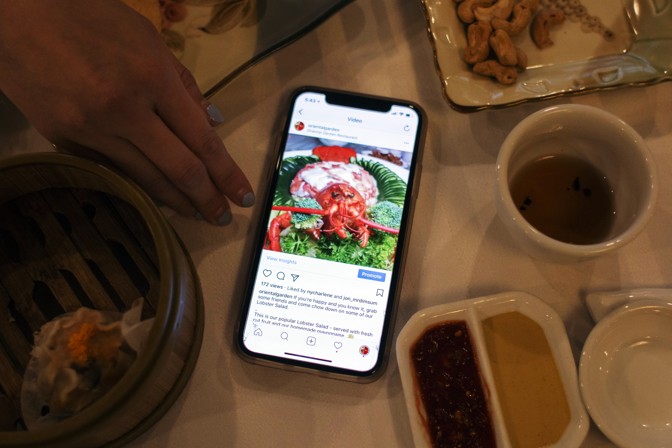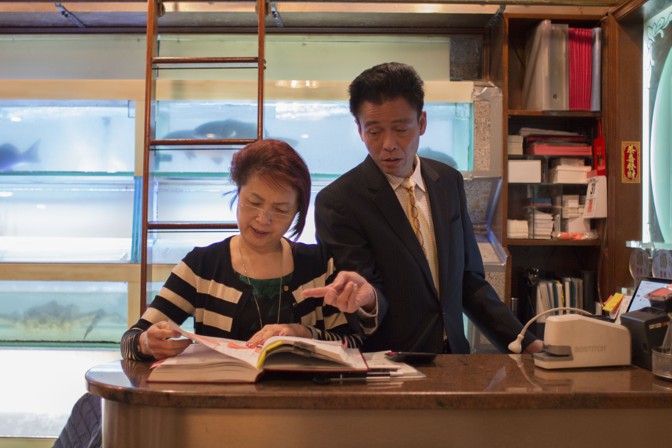Editor's Note: This article is part of an oral-history series where Aaron Reiss interviewed the young-adult sons and daughters of Chinatown shopkeepers about how they are helping to keep their families’ businesses alive.
Cynthia Koo, a 30-year-old designer, uses her marketing and art expertise to help manage an Instagram presence and an English-language website for her family’s Cantonese restaurant, Oriental Garden: “I don’t speak Chinese, and the register system is all in Chinese. But I’ve helped in other ways.â€
I spoke with Koo in the Spring of 2018. Below is our conversation lightly edited for clarity.
When I was a kid, all of our family celebrations would be here at the restaurant. I spent a lot of time after school here, and at the garment factory where my mother worked. It probably wasn’t up to code, but the children of the other seamstresses would all be there. We would run around, play in the fabric.
When I was born, my father was just a waiter at Oriental Garden. Actually, he’s worked his way all the way up from busboy to part-owner. And now my mother helps out here, too. She’s always managed the books, but now she helps behind the register as well.
I’ve never been able to do that—I don’t speak Chinese and the register system is all in Chinese. But I’ve helped in other ways. We’ll have family dinner once a week, and things just come up in conversation. My dad will run through the difficulties they are dealing with, and I’ll find ways to help.

Like, over the years, we’ve gotten press inquiries in English, but he doesn’t know how exactly how to handle them. Maybe he isn’t sure what they are asking, or how to respond. Language is hard in general. He’s also having me take the food-safety certificate classes so that I can liaise with the health-inspector authorities. The rules are really hard to decipher, and every time they get a point off, my dad is really anxious.
Read: The cow-milking robots keeping small farms in business
I also helped them with anything digital. I helped them claim their business on Yelp and make their profile nice. He might ask me, “Should I advertise on Groupon?†because he doesn’t know exactly what the service is. So I will sit down and explain how that might work. That is kind of how I saw my role, as explainer. And then he decides what’s best for his business.
We used to have an all-text menu but for someone who doesn’t know this food, it can be really hard to order. I showed my dad how to take pictures of our dishes and how to cut out the photos using Photoshop. My mom was more familiar with computers, so they did it together. Now we have a picture menu that he did himself.
A year ago, I quit my job. I was working at a financial start-up for three years.

When I left my job, and I started helping out more at the restaurant, I didn’t want to touch anything they were currently doing—I wouldn’t feel comfortable. The waiters, kitchen procedure, ingredient sourcing, I don’t know that stuff. But I’ve always helped out with design and marketing, because that is something my parents struggle with, and something I really enjoy. And given what I know about social media, I’ve always seen that as a serious hole in their operation. I offered to take up the effort of getting them on social media, and managing their presence online.
At that time, they reacted like, “Why? You have a great job. Restaurants make no money, you’re on your feet all day. This job is hard. You don’t want it!†But they were receptive to my offer to help, they always have been, even if I don’t think they fully understood what I was talking about.
So I brought in a 23-year-old intern, and she does our Instagram. My dad actually pays her out of his salary, which is amazing. I had already designed them a website, something I had been wanting to do for a long time. After that, they started getting inbound English inquiries and reservations, and English press reaching out. I wanted to be an interface between the younger, English-speaking market and what they’ve always known.
Part of the reason I started doing this is because my father works so hard, and the food is so good, and there is so much to his story. It makes me sad that they are not more successful.
We want to hear what you think about this article. Submit a letter to the editor or write to letters@theatlantic.com.
Read again Finding a Place in the Family Business, Even When You Don't Speak the Language : https://ift.tt/2PCifKp
Bagikan Berita Ini















0 Response to "Finding a Place in the Family Business Even When You Don't Speak the Language"
Post a Comment